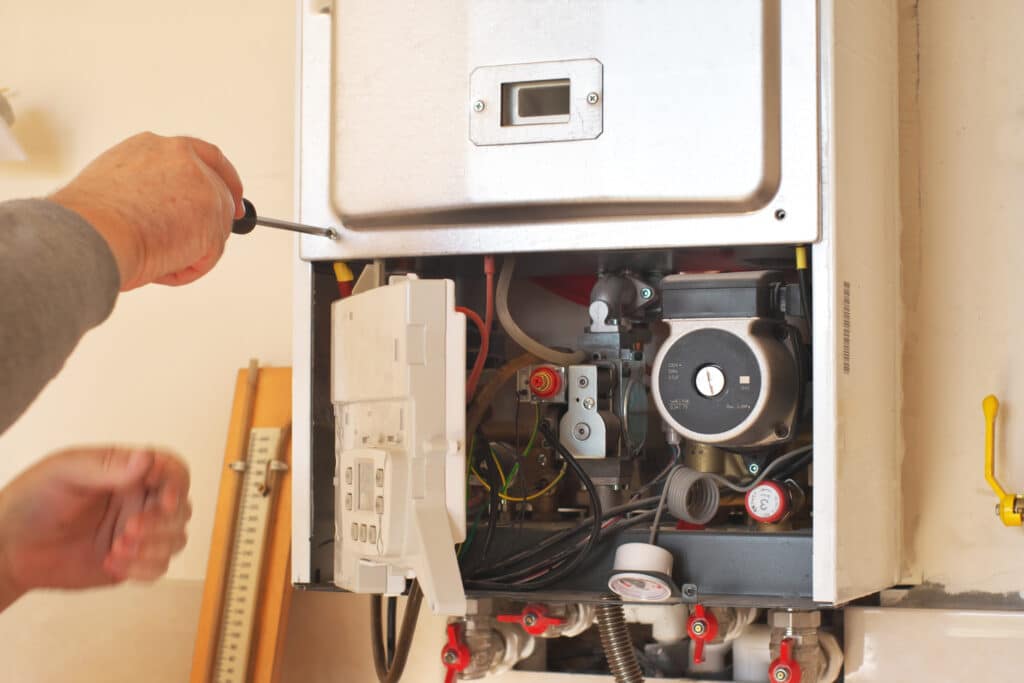
Most of us have a gas combi boiler which supplies both heating and hot water to our homes. If your boiler appears to be on and functioning but no hot water is being supplied through the taps, there are some preliminary steps you can take to resolve the issue before calling in an engineer.
As with many things, when there is something wrong with a boiler, the cause is often a simple one. So start at the beginning and run through the following.
1. The boiler is on, isn’t it?
You have most likely already tried these preliminary checks, but if you haven’t, run through the following first.
Before checking anything else, make sure that the boiler itself is actually operational. Take a look at the control panel on the boiler. If it has a digital display which is completely blank, it may be that there is no electricity being supplied to the boiler.
Try turning on your lights and electrical sockets to quickly confirm or rule out a problem with the power supply. You should also check the fuse box to check all switches are in the correct position and that nothing has tripped.
2. Check that you have gas and water being supplied
Next, make sure you have a supply of gas and water coming into the property. Simply run a tap and try operating another gas appliance such as a fire or cooker.
3. Check the boiler controls
Check that the boiler settings are correctly set. Your boiler will have individual controls to turn the heating and the hot water on and off.
It may be that the hot water or heating has been turned off by mistake, or that the settings have been inadvertently altered.
4. Check the timer
Many boilers have a timer to control the hot water. This may be why there is no hot water coming from the taps. Do check the correct time is set and that the timing settings are as you would expect.
The bi-annual changing of the clocks changing in the UK could be the reason that the timer is not turning the hot water on. Also, check if the timer has back-up batteries and that they haven’t failed.
5. Check the thermostat
The hot water temperature supplied to the radiators and taps in your home is usually controlled by a thermostat.
In most houses, boilers will have a manual dial or digital dial either mounted on the wall in the living area or hall or on the boiler itself. Ensure that the thermostat has not been accidentally set to off or set to too low a temperature to send a signal to the boiler to trigger heat.
Set the thermostat to a higher temperature than it is currently. This should send a signal to the boiler to fire up. If it fails to do so, then there may be a problem with the thermostat. This will require a visit from a Gas Safe accredited engineer.
6. Identify if there is a fault code displayed
Most modern boilers will display a fault code on the control panel. The operating manual for the boiler will tell you what most fault codes on your boiler means.
You may need to contact an engineer at this stage if you’re unable to identify what the fault code means or if you would be unable to rectify the issue that the code represents.
7. Check the diverter valve
One of the most common issues which affects the supply of hot water from a combi boiler is the diverter valve. The diverter valve opens and closes to supply heat to the radiators and to heat your water or control the flow of hot water to one or the other at a given time.
If your heating is operating but you have no hot water, or the other way round, the diverter valve may have become stuck in position. This is also an issue which will require an engineer to rectify.
If you have checked all of the above and are still none the wiser, it is always best to call a registered gas engineer.
It is very important that you only carry out checks on your boiler that are simple to do and without risk. Do not attempt to fix the issue yourself if it requires anything above a basic check as this could be extremely dangerous.
If you are unsure give our gas safe boiler experts a call.
